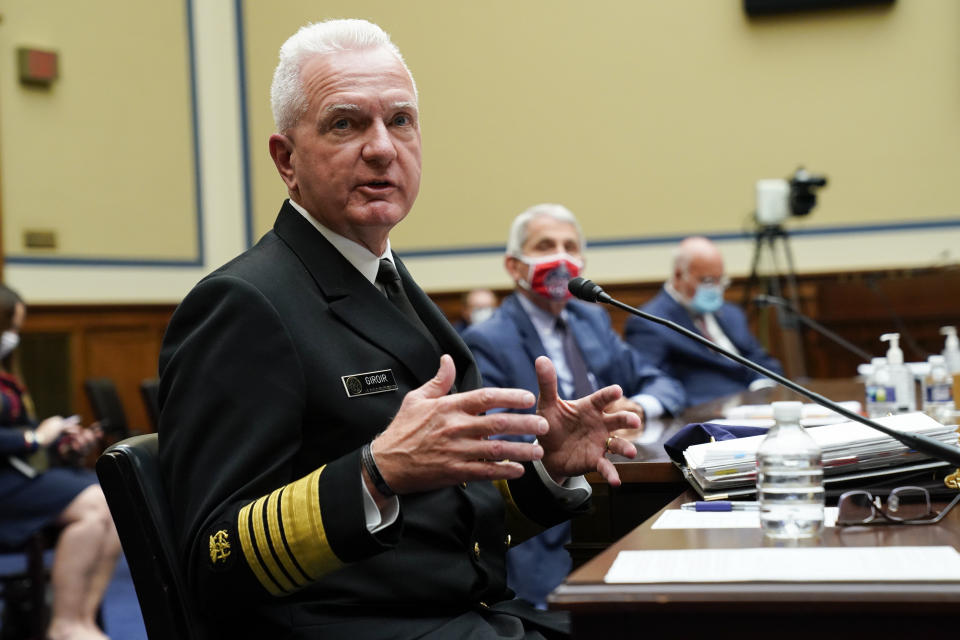Quick at-home COVID tests are 'utopian,' White House testing czar says: 'I live in the real world'
WASHINGTON — A high-ranking health official in the Trump administration admitted on Tuesday that, even as the nation’s testing capacity dramatically increases, it is unrealistic to expect that Americans will have access to cheap at-home diagnostic tests anytime soon.
“I can’t tell you. It may never happen,” Assistant Health Secretary Adm. Brett Giroir said in a call with reporters, responding to a Yahoo News question about when rapid at-home tests would become widely available.

Such tests, which do exist, could allow Americans to instantly know whether they are infected with the coronavirus. Currently, most people have to travel to a testing site, where the sample is collected and then sent to a laboratory. The results then take several days to arrive. During that time, an infected person could be unwittingly spreading the virus to others.
An instantaneous test would provide much-needed certainty that could help a person decide, say, whether to eat out at a restaurant or use public transportation.
“The inexpensive quick home-test strips, if someday available, would revolutionize how quickly we test, identify and isolate cases,” Dr. Eric Feigl-Ding, an epidemiologist, told Yahoo News. He envisioned such tests becoming an ordinary part of one’s daily routine, “like toothbrushing.”
But the vision of universal at-home testing is unrealistic, at least in the near future, Giroir cautioned, even if the technology for such tests already exists. “It’s great to talk about this utopian kind of idea where everybody has a test every day and we can do that,” he said during Tuesday’s call, without explaining whether the challenge was one of logistics, money or a different approach to public health.
A spokesperson for the federal Department of Health and Human Services did not respond to a request to clarify those remarks.
Rapid antigen tests that can be used by ordinary people at home and return results within a matter of minutes are the next frontier in coronavirus diagnostics. The impact of the technology, however, would be limited unless it was endorsed and supported by the federal government, which has thus far left many testing decisions to individual states.
Dr. Ashish Jha, dean of the Brown University School of Public Health, criticized Giroir on Twitter for what he perceived as his negativity.

“Its not utopia to want to test teachers & kids to return to school, nursing home residents to stay alive, first responders and other essential workers,” he wrote. “That’s what Whitehouse staff and major league sports get. Now. Sure, lets call it utopia when its for the less privileged.”
Jha appeared to be referring to the daily testing of NBA players and staff. The league is reportedly using a PCR test that can return results within about 24 hours, an acceptable wait considering other restrictions the NBA has put into place. But some people have reported waiting as long as two weeks to receive PCR test results. Given how and when a person transmits the virus, such results are functionally useless.
Giroir was appointed to lead White House testing efforts in March. Since that time, he has drastically increased the nation’s testing capacity. He said during Tuesday’s call that 85 million tests have been administered, and that, on average, it takes a little more than two days to learn of a test’s results.
Both of those figures represent a vast improvement over the scarcity and delays that marked much of the spring. And yet they are not enough, experts say, if people want to return to any semblance of normality. “Even under the most optimistic scenarios,” Harvard researchers Divya Siddarth and E. Glen Weyl wrote in an April study, “we need to be testing millions of people per day to allow a significant return to the workforce. Tens of million per day seems more likely and more than 100 million may be necessary in the worst case.”

New antigen tests now becoming widely available are cheaper than the PCR tests that have been the norm, and they can return results in a manner of minutes. The White House said last week that the federal government was purchasing 150 million BinaxNOW antigen tests that have been developed by Abbott Laboratories. Giroir said on Tuesday’s call that the kits would be shipped to states.
Those tests are likely to end up in eldercare facilities and schools, meaning that most people will not have access to them. An antigen test that people can administer at home, perhaps as often as once a day, could alter the course of the pandemic, which has killed more than 180,000 people in the United States.
According to Giroir, that will remain the stuff of fantasy, even though at-home tests have been developed. “I don’t live in a utopian world,” he said. “I live in the real world.” He did not explain why it was impossible or unrealistic to rapidly scale up the production and distribution of such tests.
Giroir offered that “we can return to society without everyone having to have a test every single day.” That seems to mirror President Trump’s conviction that the United States has a problem with too much testing, not too many coronavirus cases. Virtually the entire medical establishment disagrees with that view.
With additional reporting by Andrew Romano.
_____
Read more from Yahoo News:



